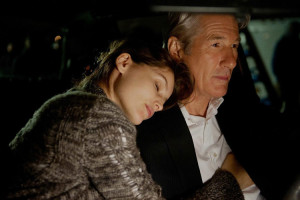Richard Gere is back in “Arbitrage,” a deceptively dark and captivating thriller about a high-power CEO balancing family life, a pending merger, and a series of indiscretions that have the capacity to unravel lives. Interwoven with tragedy, lined with haunting and ambient music, and underscored with colossal struggles with right and wrong on all sides, “Arbitrage” is a surprisingly powerful movie whose lack of moralizing accomplishes what a blunter parable may not have – a keen observation on greed, cover-ups, and what some people will do to protect their most valued assets.
Robert Miller (Richard Gere) has it all. He is in the middle of a multi-billion dollar deal to sell his company, Miller Capital, to a high-power buyer, and has a loving family. His wife (Susan Sarandon) looks the part of a successful partner, and his daughter Brooke (Brit Marling) is all but his equal, a loving daughter also working as his Chief Investment Officer. She’s all business, yet seems inherently perplexed at his desire to sell. He wants to spend more time with the family, out of the office, he narrates. She smiles bemusedly, “I’m just trying to imagine what we’d do.”
The family dynamics are further blurred as Miller sneaks off from a party to meet his mistress, a lovely artist named Julie (Letitia Casta), whom he has also been supporting financially. Interestingly the movie paints their affair as a close relationship, and less like a throw-a-way fling. She’s beautiful, and is on his mind during subsequent business dealings: at a trip to the office, during a limousine ride, at a high-stakes business dinner. Everyone in this movie has a Blackberry; where it is mostly used in the business world to close deals, here it used by Miller to set up trysts. The line between business and pleasure is hastily drawn.

We also see that Miller is struggling financially, the sale of his company to a major bank being held shakily together by a $412M loan from a friend (Larry Pine) to plug the hole of a bad investment. With jail time in the cards if discovered, Miller grows increasingly anxious with the stall tactics of his potential buyer (Graydon Carter), which threaten to bring his financial depravity to light.
Miller’s shadowed life comes to a head as he and Julie take a late drive out of the city to get away. Miller is exhausted; he closes his eyes briefly, and the car hits a siding before flipping viciously down the highway. Miller first looks at his own injuries, noticing Julie – who was killed instantly – only as an afterthought. He attempts to dial 9-1-1, thinks better of it, and calls a friend to pick him up discreetly. Julie’s death – as well as his own devastating injuries from the crash – become a problem to Miller, both of which he desperately tries to cover up.
“Arbitrage” works as a movie due to a captivating script, and stellar acting from all involved. As Miller, Gere shows he still has what it takes in roles such as this, pulling off the dual life Miller has to play with seeming ease. It struck me that Gere, known for such movies as “The Jackal” and “Runaway Bride,” hasn’t starred in a high energy role for quite some time, and it’s refreshing to see he hasn’t lost a step along the way. In equal measure, as his wife, Sarandon brings a believable performance to the table, showing more confidence and depth than in previous roles such as her short appearance in the 2004 remake “Alfie,” or her quirky performance in the bizarre 2002 drama “Igby Goes Down.”
Other actors fill in necessary plot, such as Nate Parker, playing Jimmy who picks Miller up the night of the accident, as well as over-dedicated Detective Breyer (Tim Roth) who will stop at nothing to connect the dots between Jimmy, Miller, and the late Julie. If “Arbitrage” means to make the statement “power corrupts,” the lines become increasingly blurred as Breyer, jaded from a life of seeing the rich and powerful get away with murder, perhaps bends the law too much in his quest for justice. As a result, his actions cause us to question who the real villain is, as well as perhaps garnering unintentional sympathy for Miller’s character at the same time.
Really only suffering from a couple last minute, untied loose ends, “Arbitrage” is successful and engaging. The atmosphere and acting is effective and intriguing, the dialogue is spot on, and the ending – albeit brief – offers audiences food for thought on the underhanded practices of one family’s financial legacy, as well as the effect these dealings can have on even the most ardently morally inclined.
“Arbitrage” feels like a movie written for a decade past, where thrillers like this were a dime a dozen. Perhaps in such a time period it would have simply faded into the crowd. However, for its wide sweeping lens, powerful acting, and compelling story, “Arbitrage” is right at home in 2013, presenting an entertaining and powerful story you’d be wise not to pass up.
– by Mark Ziobro
1 Comment
great review you finally got something right